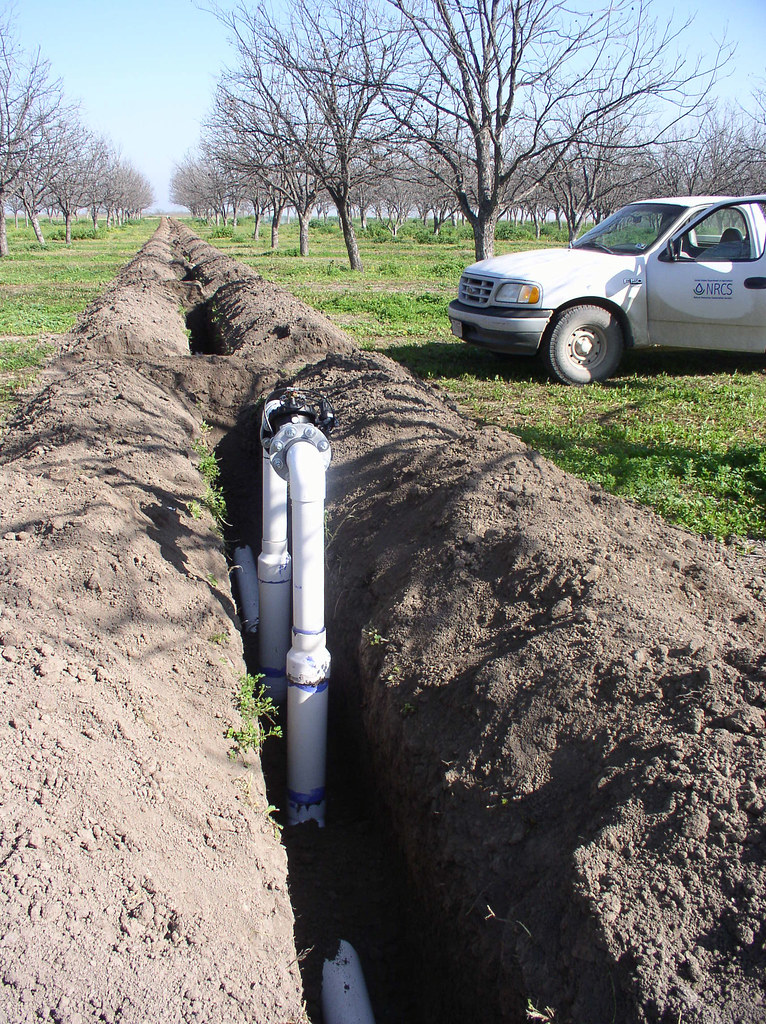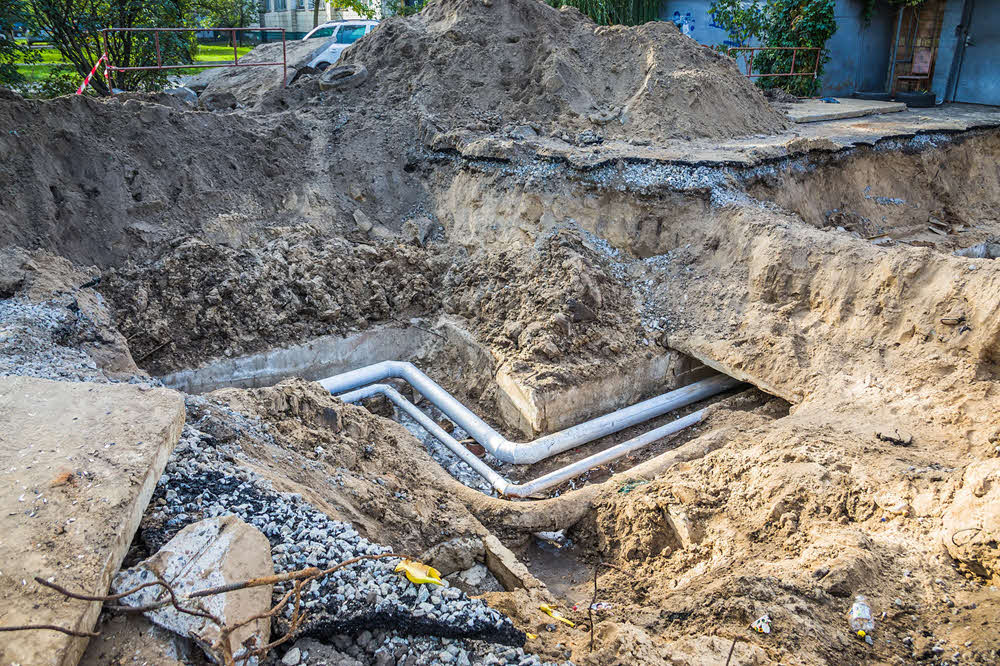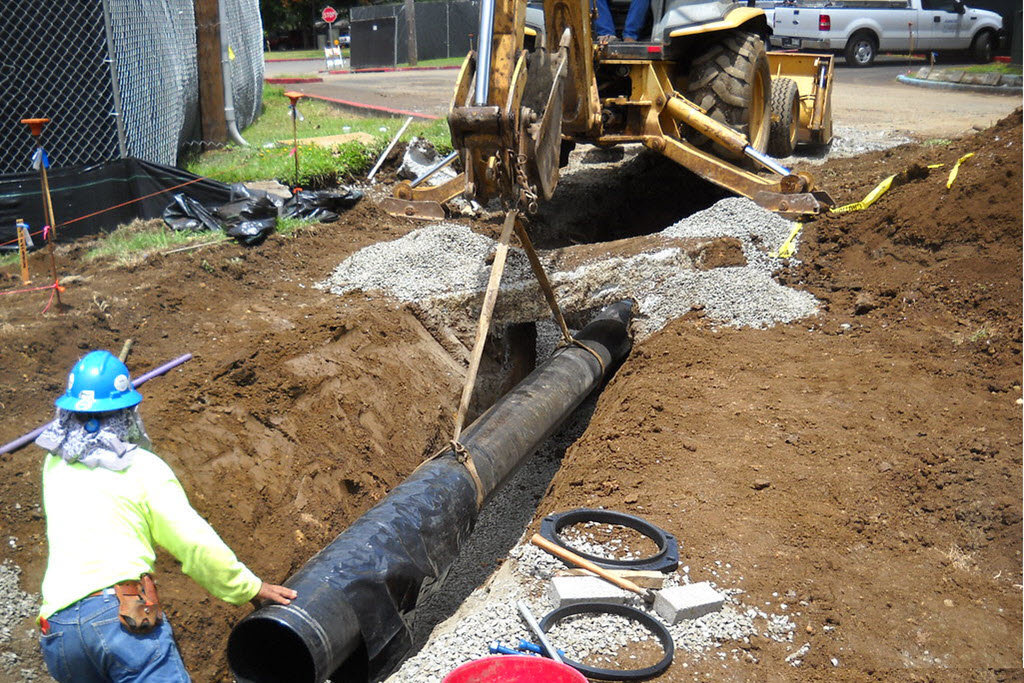Trenching Water Line Servicesin Madison Heights MI
Trenching for Water Lines to Ensure Reliable Water Flow
We Are Locally Owned & Operated For Over 37 Years
Contact Us Today!
We Serve Businesses In And Around The Following Cities:
About Trenching Water Line Services
Introduction
The provision of an adequate and consistent water supply is an essential consideration for every commercial property in Madison Heights. The process of trenching for a water line is not only a vital aspect of the construction process but also crucial in ensuring long-term sustainable water provision. The role it plays in water main installation and running a new water line surpasses superficial notions. This article focuses on everything you need to understand about trenching for water lines, its benefits, and practical real-world applications within Madison Heights.
The Process of Trenching For a Water Line
Whether you’re installing a water service line in a newly constructed property or updating an old system, the current advancements from companies like D&J Contracting significantly streamline the process. The initial phase involves outlining the proposed water line’s route, ensuring it meets the local Madison Heights code requirements. It is followed by digging a trench, typically 18 to 48 inches deep, wide enough to accommodate the water pipes and the necessary tools for the completion of the project.
D&J Contracting prides itself on adopting trenchless technologies which are fast, non-intrusive and help preserve the architectural aesthetic of the surroundings in Madison Heights. After the trench is dug, the water pipe gets aligned correctly in the trench to prohibit potential damage or disarrangement. The proverbial cherry on top involves backfilling the dug trench and restoring the surface to its original condition.
Why Trenching for a Water Line is Important
A well-executed trench for a water line serves as a vital pathway for seamless water supply, profoundly impacting the productivity and functionality of commercial properties. Proper trenching mitigates the risk of pipe breaks or leaks, ensuring uninterrupted water flow. It also makes maintaining and repairing the line easier, saving businesses unwanted expenditure on emergency repairs. Therefore, investing in trenching for a water line with experienced professionals like D&J Contracting, who are adept at installing water service lines, is a critical factor in a commercial property’s successful operation in Madison Heights.
Real-World Applications and Benefits
Real-world applications of trenching for water lines are vast – ranging from small businesses to large commercial complexes. A well-laid trench goes a long way in ensuring that the installed water service line connects the city’s water source to the building efficiently. For instance, a commercial complex in Madison Heights recently renovated its water system, hiring D&J Contracting for trenching and running a new water line. The complex has not reported any water-related issues since the installation.
The benefits of trenching for water line extend beyond efficient water supply. Trenchless methodologies adopted by D&J Contracting yards minimize the landscape disruption, offer faster installation, reduce labor costs and provide a cleaner, more environmental-friendly solution. The long-term savings and hassle-free maintenance this technique offers elevate its necessity in commercial properties.
In addition, choosing professionals like D&J Contracting, who have a profound understand of Madison Heights local regulations, ensures that your commercial property meets all the necessary compliance requirements. This not only keeps you in the good books with the authorities but also saves you from hefty penalties and delays.
The Way Forward
The significance of trenching for a water line in commercial properties, particularly in Madison Heights, is unquestionable. It sets the foundation for an efficient water network that keeps businesses running smoothly. Though it might seem like a daunting, invasive process, with industry experts like D&J Contracting and their adherence to trenchless technologies, it’s a smooth, hassle-free endeavour. From the process of trenching to reestablishing the landscapes, their dedicated approach pays attention to every little detail, ensuring your commercial property’s water system performs optimally.
As we reflect on these insights, it emerges that investing in professional trenching for a water line pays for itself in the long run, optimizing commercial properties’ performance. Understanding and implementing high-quality trenching services warrants a smooth, uninterrupted water flow, allowing businesses within the properties to thrive. Therefore, when it’s time to install a water service line or run a new water line, seeking specialized services from professionals like D&J Contracting becomes a worthwhile consideration. It’s a positive step towards ensuring your commercial property not only meets but also surpasses Madison Heights’ water supply standards.
Trenching Water Line Services Gallery


Call Us Today to receive your Free Quote for
Trench For Water Line in Madison Heights
Serving: Madison Heights, Michigan

About Madison Heights, Michigan
Originally part of Royal Oak Township, Madison Heights incorporated as a city by popular vote on January 17, 1955, and chartered on December 6 of that same year, becoming the tenth city government in southern Oakland County. At that time, the 7.2 square miles (18.6 km) city was one of the largest suburban communities in the Metro Detroit area. The first city hall was at 26305 John R Road, the former township offices. On April 5, 1963, a new municipal building was dedicated which is on the present location at 300 West Thirteen Mile Road. The city lies in the Interstate 696 (I-696) and I-75 corridor and is served by two primary school districts, Lamphere and Madison, as well as a full-service municipal government.
According to the United States Census Bureau, the city has a total area of 7.09 square miles (18.36 km), all land.
Although 91% of the buildings in Madison Heights are single-family homes or condominiums (approximately 9,800 residential property owners), 60% of the tax base is fueled by light industrial or commercial property. The city has 15 voting precincts, totaling more than 21,000 registered voters.
Madison Heights shares borders with Troy to the north, Royal Oak to the west, Hazel Park to the south, and Warren to the east. The eastern border of Madison Heights (Dequindre Road) is also the border between Oakland and Macomb counties.
There are more than 112 miles (180 km) of road within Madison Heights, of which the city maintains 105 miles (169 km), 95 miles (153 km) for snow removal, sweeping, and patching. Interstate 75 passes north to south on the west side of the city, and Interstate 696 is the major feature of its southern border. The junction of these two highways is shared with Royal Oak and Hazel Park on the southwest corner of Madison Heights.
| Census | Pop. | Note | %± |
|---|---|---|---|
| 1960 | 33,343 | — | |
| 1970 | 38,599 | 15.8% | |
| 1980 | 35,375 | −8.4% | |
| 1990 | 31,296 | −11.5% | |
| 2000 | 31,101 | −0.6% | |
| 2010 | 29,694 | −4.5% | |
| 2020 | 28,468 | −4.1% | |
| U.S. Decennial Census | |||
As of the 2020 United States census of 2020, there were 28,468 people and 13,487 households in the city. The population per square mile is 4,017.5.
The racial makeup of the city was 80.4% White, 7.8% African American, 0.2% Native American, 7.2% Asian, 0.1% Pacific Islander, 3.6% from two or more races. Hispanic or Latino residents of any race were 2.0% of the population.
There were 13,487 households, of which 14.7% spoke a language other than English at home. People under 65 years of age with a disability accounted for 11.1% of the city’s population, and 11.7% of the city’s population was living below the federal poverty line. Households without a broadband internet subscriptions made up 11.9% of the community.
16% of residents were under the age of 18; and 16.3% were 65 years of age or older. The gender makeup of the city was 49.4% male and 50.6% female.
As of the census of 2010, there were 29,694 people, 12,712 households, and 7,543 families residing in the city. The population density was 4,188.2 inhabitants per square mile (1,617.1/km). There were 13,685 housing units at an average density of 1,930.2 per square mile (745.3/km). The racial makeup of the city was 83.9% White, 6.4% African American, 0.5% Native American, 5.8% Asian, 0.1% Pacific Islander, 0.7% from other races, and 2.7% from two or more races. Hispanic or Latino residents of any race were 2.5% of the population.
There were 12,712 households, of which 27.5% had children under the age of 18 living with them, 41.0% were married couples living together, 12.9% had a female householder with no husband present, 5.4% had a male householder with no wife present, and 40.7% were non-families. 34.1% of all households were made up of individuals, and 11.8% had someone living alone who was 65 years of age or older. The average household size was 2.32 and the average family size was 3.02.
The median age in the city was 38.3 years. 20.4% of residents were under the age of 18; 8.7% were between the ages of 18 and 24; 30.4% were from 25 to 44; 26.6% were from 45 to 64; and 13.9% were 65 years of age or older. The gender makeup of the city was 49.1% male and 50.9% female.
As of the 2000 United States census, there were 31,101 people, 13,299 households, and 8,005 families residing in the city. The population density was 4,341.3 inhabitants per square mile (1,676.2/km). There were 13,623 housing units at an average density of 1,901.6 per square mile (734.2/km). The city’s racial makeup was 89.60% White, 1.82% African American, 0.44% Native American, 4.97% Asian, 0.03% Pacific Islander, 0.46% from other races, and 2.68% from two or more races. Hispanic or Latino residents of any race were 1.61% of the population.
There were 13,299 households, of which 26.9% had children under the age of 18 living with them, 45.2% were married couples living together, 10.5% had a female householder with no husband present, and 39.8% were non-families. 33.8% of all households were made up of individuals, and 12.3% had someone living alone who was 65 years of age or older. The average household size was 2.33 and the average family size was 3.02.
In the city, 22.1% of the population was under the age of 18, 8.1% was from 18 to 24, 35.4% from 25 to 44, 20.2% from 45 to 64, and 14.2% was 65 years of age or older. The median age was 36 years. For every 100 females, there were 95.8 males. For every 100 females age 18 and over, there were 92.9 males.
The city’s median household income was $42,326, and the median family income was $51,364. Males had a median income of $41,478 versus $29,345 for females. The city’s per capita income was $21,429. About 7.0% of families and 8.9% of the population were below the poverty line, including 10.8% of those under age 18 and 13.0% of those age 65 or over.
In 2008, 1.9% of the Madison Heights population were of Vietnamese descent. 168 Asian Mart, a 38,000-square-foot (3,500 m) supermarket, is the largest Asian supermarket in southeast Michigan, and one of the largest in the state. The Chinese Cultural Center is in Madison Heights.
The mayor of Madison Heights is Roslyn Grafstein, who was appointed as Mayor in August 2020 to fill a vacant seat.
Madison District Public Schools and Lamphere Public Schools have public schools serving Madison Heights.
Bishop Foley Catholic High School is a private school.
Four Corners Montessori Academy is a public charter school.
Call Us Today to receive your Free Quote for
Trench For Water Line in Madison Heights
Related Services in Madison Heights, Michigan
We Serve Businesses In The Following Zip Codes:
48007, 48015, 48021, 48026, 48035, 48036, 48038, 48042, 48043, 48044, 48045, 48046, 48047, 48048, 48050, 48051, 48066, 48071, 48080, 48081, 48082, 48083, 48084, 48085, 48088, 48089, 48090, 48091, 48092, 48093, 48098, 48099, 48225, 48230, 48236, 48310, 48311, 48312, 48313, 48314, 48315, 48316, 48317, 48318, 48397